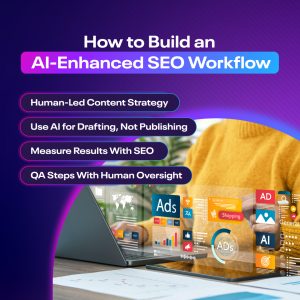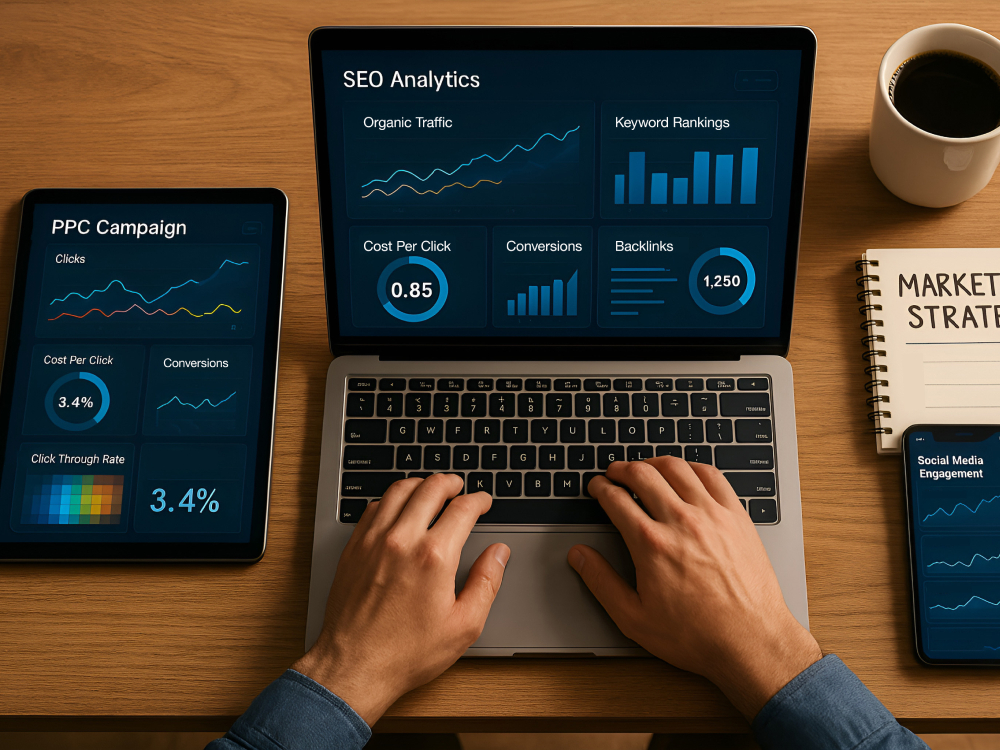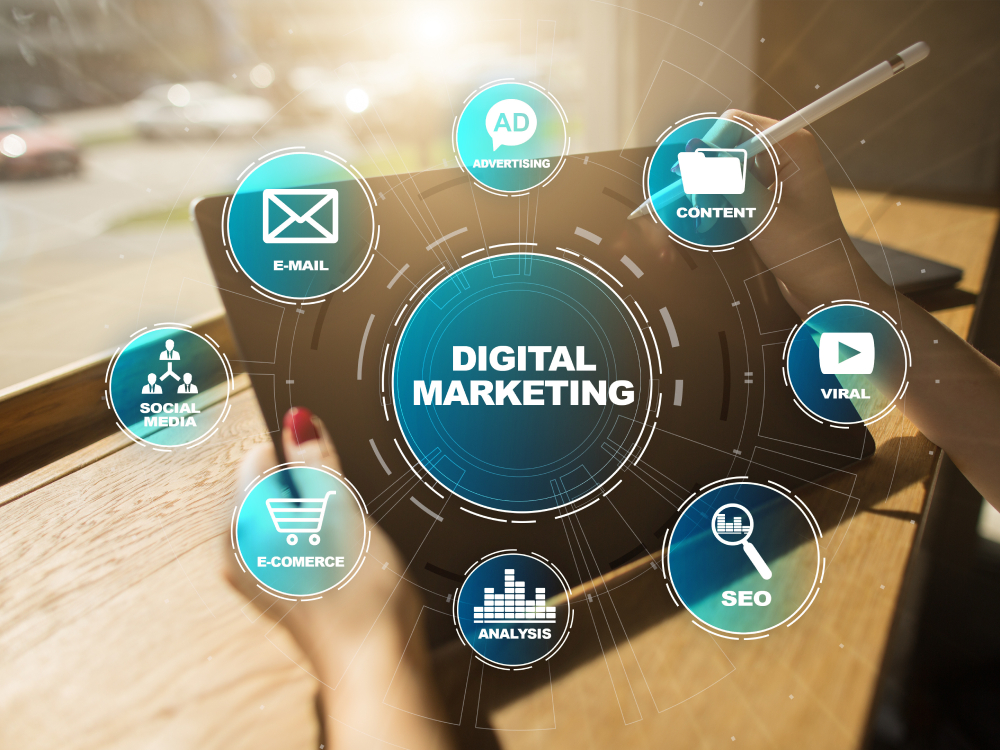INSIGHTS
Search engine algorithms continue to evolve, and artificial intelligence now plays a significant role in how websites are ranked. From generating content to analyzing keywords and search trends, AI tools offer impressive speed and efficiency. But while they can process data quickly, they lack the nuance, strategy, and creativity that only people bring to the table.
AI can support your SEO strategy, but it can’t replace it. Human insight is essential for making smart decisions, adapting to changing algorithms, and creating content that connects with real audiences. In this article, we’ll explore why combining AI-powered tools with human strategy delivers better results than relying on automation alone.
What Is AI SEO?
AI SEO refers to the use of artificial intelligence tools and technologies to improve your search engine optimization strategy. These tools can automate keyword research, analyze search intent, suggest content ideas, optimize technical SEO, and even help create content based on user behavior and algorithm patterns. Instead of replacing traditional SEO, AI helps marketers make faster, data-driven decisions that support higher rankings, better visibility, and improved user experience.
How Does AI SEO Work?
AI SEO works by processing large amounts of search data and identifying patterns that would take humans much longer to analyze. It can uncover which keywords are driving traffic, predict how algorithms may respond to certain optimizations, and recommend changes to improve your site’s performance.
Some tools generate content outlines, evaluate competitors, or score your content’s relevance for specific queries. Others automate tasks like internal linking or on-page optimization. While AI can provide the insights, it still takes human strategy to interpret them and apply the right actions in context.
The Limitations of AI Without Human Guidance
AI tools can enhance your SEO workflow, but without human oversight, they often fall short. Automation alone doesn’t guarantee results, and in many cases, it can hurt performance if misused. Here’s why AI works best when guided by human expertise.
Misunderstanding Nuance and Search Intent
AI can identify keywords, but it often struggles to understand why users are searching. Without human insight, content may miss the mark by focusing on literal matches instead of solving the user’s actual problem or answering their intent clearly.
Lack of Original Thought or Brand Voice
AI-generated content can sound generic or formulaic. It lacks the emotional intelligence and creativity needed to represent your brand voice, differentiate your message, and connect with your audience in a meaningful way.
Risks of Over-Optimization or Penalties
Relying solely on AI can lead to practices that trigger search engine penalties, such as keyword stuffing or unnatural phrasing. Without a human editor, your content could become overly optimized for algorithms rather than for real users.
AI’s Tendency to Repeat or Overuse Keywords
Many AI writing tools lean heavily on repetition. This can dilute content quality and annoy readers, making it harder to keep people engaged and harder for search engines to value your page as unique or helpful.
Inability to Adjust for Market, Trends, or Tone
AI lacks real-time market awareness. It doesn’t track breaking news, shifting consumer sentiment, or seasonal changes in tone. Human strategists can adapt quickly, align messaging with current trends, and make sure content stays relevant.
Why Human Strategy Still Matters
AI can support your SEO efforts, but it can’t replace the value of human thinking. A successful SEO strategy requires more than automation—it needs context, creativity, and decision-making rooted in experience. Human marketers bring emotional intelligence, adaptability, and the ability to craft messaging that builds trust, resonates with readers, and aligns with long-term business goals.
Strategic Content Planning and Goal Setting
Human-led SEO strategies and planning ensures every piece of content is tied to a clear business objective. Whether the goal is lead generation, brand awareness, or rankings for high-intent keywords, people understand the bigger picture. Human strategy allows you to prioritize efforts, identify gaps, and create content that supports growth rather than just ticking SEO boxes.
Creative Storytelling and Brand Messaging
AI can generate text, but it cannot replicate your brand voice or infuse personality into content. Human strategists craft stories that reflect your values, differentiate your business, and connect with your audience. This kind of creative storytelling builds emotional resonance and customer loyalty, which is something no algorithm can generate on its own.
Adapting to Industry Changes and Algorithm Shifts
Search engines constantly update their algorithms, and trends shift quickly. Humans are uniquely capable of reading between the lines, analyzing changes, and adjusting strategies in real time. While AI relies on past data, marketers can pivot with insight by keeping your content competitive and aligned with what’s working today.
Human Editing for Voice, Flow, and Trustworthiness
Even the best AI tools need human editors to refine tone, improve readability, and ensure accuracy. Editors can spot unclear phrasing, correct inconsistencies, and polish copy so it feels trustworthy and natural. These small but critical adjustments help build authority and make sure your content stands out from AI-generated noise.
How AI and Human SEO Experts Work Best Together
AI is a powerful tool, but it reaches its full potential when paired with human expertise. Rather than replacing marketers, AI empowers them by speeding up repetitive tasks and delivering deep insights that fuel smarter strategies. The combination of automation and creativity leads to faster workflows, stronger content, and better overall SEO performance.
Using AI to Speed Up Research and Analysis
AI excels at scanning large volumes of data quickly. It can analyze competitors, identify keyword opportunities, monitor SERP trends, and surface patterns that would take a human hours to uncover. When SEO experts use AI to accelerate research, they free up time to focus on strategy, decision-making, and content creation.
Streamlining Content Outlines and Structure
AI tools can help generate content outlines based on top-performing pages, search intent, and keyword groupings. These outlines give writers a clear structure to build from, saving time and reducing guesswork. Human strategists can then refine the structure to ensure it aligns with brand goals and offers real value to readers.
Optimizing Content with Human Editing and Intent
Once AI drafts are created or outlines are complete, human editors take over to fine-tune tone, intent, and messaging. Editors ensure content reads naturally, speaks to the right audience, and avoids common SEO missteps like keyword stuffing. This partnership ensures content is both search-friendly and genuinely helpful.
Combining AI Data with Human Creativity for Better Results
The most effective SEO content blends machine intelligence with human insight. AI provides the data, patterns, and predictions while humans bring creativity, empathy, and storytelling. Together, they create content that performs well in search engines and resonates with real people, turning rankings into results and clicks into conversions.
How to Build an AI-Enhanced SEO Workflow
Integrating AI into your SEO strategy requires more than just plugging in tools. To get meaningful results, you need a workflow that blends AI efficiency with human direction. This approach keeps your content strategic, your quality high, and your processes streamlined. Here’s how to structure an AI-enhanced SEO workflow that actually works.
 Start With a Human-Led Content Strategy
Start With a Human-Led Content Strategy
Before using AI, define your goals, target audience, and keyword strategy. This sets the foundation for content that aligns with your brand and drives real results. A human strategist ensures the content plan supports larger marketing objectives and speaks directly to your audience’s needs, which is something AI alone can’t determine.
Use AI for Drafting, Not Publishing
AI can generate first drafts, content snippets, or outlines quickly, helping you move faster. But these drafts should always be treated as a starting point. Without human input, AI-generated content can sound generic, off-brand, or inaccurate. Let AI handle the busywork, but rely on people to make it publish-ready.
Set Review and QA Steps With Human Oversight
Every piece of content should go through an editing and quality assurance process. Human reviewers can spot factual errors, correct tone and voice, ensure SEO best practices, and make sure content complies with brand guidelines. This step is essential to maintain trust, credibility, and search performance.
Measure Results With SEO and Engagement Metrics
Track how your AI-assisted content performs using a mix of SEO and user engagement metrics. Monitor rankings, traffic, and click-through rates alongside bounce rates, time on page, and conversions. Human analysis is key to interpreting these metrics and making decisions about what to refine, scale, or test next.
Is AI SEO Right for Every Business?
AI-powered SEO offers clear advantages, but that doesn’t mean it’s a one-size-fits-all solution. The success of AI depends on how well it aligns with your business goals, industry needs, and internal capabilities. Understanding when, where, and how to use AI (and when human insight matters more) is key to building a strategy that actually works.
Understanding Your Content Goals
Before integrating AI, get clear on what you want your content to achieve. Are you trying to educate, convert, or rank? High-volume blogs may benefit from AI-generated outlines, while sales or brand messaging needs a more personal touch. Your goals should guide when and how AI supports your SEO efforts.
Knowing When to Use AI and When Not To
AI is great for speeding up keyword research, content suggestions, and technical SEO checks. But for thought leadership, storytelling, or anything requiring emotional resonance, human writers are essential. The best strategies blend both, depending on the content’s purpose.
How Industry-Specific Needs Shape Strategy
Some industries require technical accuracy, strict compliance, or deep subject matter expertise. In these cases, relying solely on AI can lead to costly errors. B2B, medical, legal, and financial businesses often need a more human-led approach to ensure trust, clarity, and authority. Your industry should influence how you build your AI SEO workflow.
Choosing the Right SEO Partner for Your Business
If you’re exploring AI SEO, the right partner makes all the difference. Look for an agency that offers both technical tools and strategic guidance. They should understand your goals, help you evaluate where AI fits, and ensure quality stays high across every piece of content. A smart partner knows when to automate and when to lean on human expertise.
Schedule a Consultation with an Orlando Search Optimization Agency
Combining artificial intelligence with expert strategy gives your business the advantage of speed, clarity, and precision. But real results come from planning and execution that are guided by experience. Whether you’re launching a new campaign or refining your content strategy, the right mix of tools and talent makes all the difference.
At Brandcoders, we bring together proven search engine optimization (SEO) strategies and advanced technology to help businesses grow and compete online. As a leading Orlando search engine optimization (SEO) agency and Orlando web design agency, we focus on creating thoughtful, scalable solutions tailored to your goals. Schedule a consultation today to see how our AI-enhanced SEO strategies can drive real growth for your business.
Talk to a sales agent today to jump start your project.
Call (407) 992-8877






